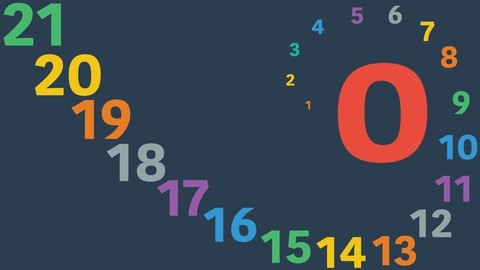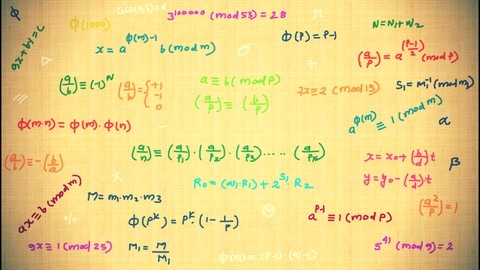Number theory is a branch of mathematics that explores the properties of integers, including prime numbers, divisibility, and modular arithmetic.
It’s a fascinating field with applications in cryptography, computer science, and other areas of mathematics.
Learning number theory can help you develop a deeper understanding of the fundamental building blocks of our number system, leading to a greater appreciation for the elegance and complexity of mathematics.
Finding a high-quality number theory course on Udemy can be a daunting task.
You want a course that is comprehensive, engaging, and taught by experienced instructors who can make complex concepts accessible.
We’ve carefully reviewed numerous courses and identified Number Theory as the best overall option on Udemy.
This course stands out for its comprehensive coverage of fundamental number theory concepts, from the basics of number sets and arithmetic operations to advanced topics like modular arithmetic, prime numbers, and unsolved problems.
It’s taught in a clear and engaging manner, making it suitable for both beginners and those seeking to deepen their knowledge.
While Number Theory is our top pick, there are other great courses available on Udemy that cater to different learning styles and interests.
Keep reading to explore our recommendations for programmers, math students, and anyone interested in unlocking the mysteries of number theory.
Number Theory
You will start with the basics, learning about number sets, patterns, properties, and proofs.
From there, the course dives into different number bases like binary and hexadecimal, covering arithmetic operations in each system.
The course explores fascinating number sequences like factorials, Fibonacci, and Tribonacci, as well as special numbers like perfect, amicable, and prime numbers.
You’ll learn Euclid’s theorems and the fundamental theorem of arithmetic related to primes.
The syllabus even touches on unsolved problems in number theory.
Modular arithmetic is a key topic, covering congruences, residue systems, modular operations, and inverses.
You’ll study important theorems like Fermat’s Little Theorem, Euler’s Totient Function, and the Chinese Remainder Theorem.
The applications extend to cryptography concepts like public-key encryption, RSA, and the Diffie-Hellman protocol.
Other highlights include continued fractions, their types, and how to find matrix determinants.
The course wraps up with a bonus lecture, leaving you with extra knowledge.
Quizzes are spread throughout to reinforce your learning.
Number Theory for Programmers
The course offers a comprehensive exploration of number theory concepts essential for programmers.
You will start by understanding the fundamentals of number systems and their bases.
The course covers standard number systems like decimal, octal, hexadecimal, and binary in depth.
For each system, you will learn conversion techniques between different bases, enabling you to seamlessly translate numbers.
The course dives into arithmetic operations like addition and subtraction within these number systems, equipping you with practical skills.
A key focus area is the signed integer representation using 2’s complement.
You will grasp the concept of complements and how they facilitate subtraction.
The course thoroughly explains the range of values in 2’s complement representation, ensuring a solid understanding.
Moving beyond integers, the syllabus delves into real number representation using the IEEE 754 standard.
You will learn how decimal real numbers are converted to the IEEE 754 single-precision format and vice versa, demystifying the process.
Throughout the course, you will have opportunities to reinforce your learning through quizzes and exercises.
Additionally, you will get to design your own number system, fostering creativity and deeper comprehension of the underlying principles.
Number Theory / Modular Arithmetic
You’ll start with the fundamentals of modular arithmetic, including calculating modulus values and simplifying congruences.
The course dives deep into important concepts like the Euclidean algorithm for finding the greatest common divisor, solving Diophantine equations, and calculating inverse moduli.
You’ll learn about linear congruences and the powerful Chinese Remainder Theorem for solving systems of congruences.
Modular exponentiation using the distributive law is covered, along with Fermat’s Little Theorem and the Euler totient function.
These lead into Euler’s Theorem, which provides a way to simplify certain linear congruences.
The course explores prime numbers, including generation algorithms like the Sieve of Eratosthenes and prime factorization.
You’ll study quadratic residues, the Legendre symbol for determining if a number is a quadratic residue modulo a prime, and the related Jacobi symbol.
With numerous examples and step-by-step explanations throughout, you’ll gain a solid understanding of the core concepts in number theory and modular arithmetic.
Whether you’re a math student, a computer scientist interested in cryptography, or just looking to challenge yourself, this comprehensive course has you covered.
Introduction to Number theory
This course will provide you with a comprehensive introduction to the fundamental concepts of number theory.
You will start by exploring the divisibility theorem, which lays the groundwork for understanding how numbers can be divided and their relationships.
Next, you’ll delve into the greatest common divisor (GCD), a crucial concept that helps determine the largest positive integer that divides two or more integers.
This will lead you to the study of prime numbers, the building blocks of all integers.
Modular arithmetic will be a key focus, allowing you to understand how numbers behave when divided by a specific integer.
You’ll learn about operations and properties within this system, which has applications in areas like cryptography.
The course will also cover perfect squares and their properties, giving you insights into the patterns and relationships among square numbers.
Additionally, you’ll explore the greatest integer function (GIF), a concept used in various mathematical fields.
Throughout the course, you’ll gain a solid grasp of these fundamental number theory concepts, which will provide a strong foundation for further study in mathematics or related disciplines.
Number Theory (Unvisited applications in the Real World)
The course starts with a basic introduction to all types of numbers, followed by in-depth explorations of the numbers 2 and 3.
You’ll learn about “Number Eyes” and tackle the “Dazzling Problem” and “Number Check” challenges.
The course delves into more interesting problems in numbers, encouraging you to ponder and talk about numbers.
You’ll get ample practice opportunities and chances to think deeply about the subject matter.
The power of numbers and their presence in nature will be explored, along with their role in the market and psychology.
Prepare for a skill test and a “WIN-WIN” section, where you’ll learn about the applications of numbers in economics, budgeting, and calculating winning odds.
The course even covers the psychology of gambling, advising you to stop gambling altogether.
Regular knowledge checks will help you solidify your understanding.
Expect to learn about the “Mater Key” and develop intuition about numbers through discussions of ancient number theory.
The course culminates with a “Number Talk” session and a comprehensive wrap-up, including a short quiz to summarize everything you’ve learned.
With its engaging and practical approach, this course promises to broaden your understanding of number theory and its real-world applications.
The Theory of Numbers - Andrew Wiles
The course dives into the fascinating world of number theory, starting with its origins and the pioneering work of Pierre de Fermat.
You’ll learn about Fermat’s famous Last Theorem, which remained unsolved for centuries and sparked intense mathematical duels as brilliant minds attempted to crack it.
The course takes you on a journey through the evolution of number theory, exploring its transition into a pure science and the birth of modern mathematics.
Along the way, you’ll discover the charm of unsolved problems and the grand challenges that have driven the field forward.
A significant portion of the course is dedicated to Andrew Wiles, the mathematician who finally resolved Fermat’s Last Theorem in the 1990s, achieving a remarkable feat that had eluded the greatest minds for over 300 years.
You’ll gain insights into Wiles’ groundbreaking work and the impact it had on the mathematical community.
You will learn about the origins of the field, its key problems and solutions, and the awards and recognition that have shaped its development over time.






